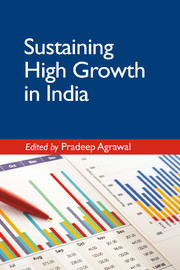Book contents
- Frontmatter
- Contents
- List of Tables
- List of Graphs and Maps
- Preface
- Introduction
- Section 1 Ensuring Macroeconomic Stability for Sustaining High Growth Rates
- Section 2 Promoting Industrial Development for Sustaining High Growth Rates
- Section 3 The International Economic Issues and Sustaining High Growth
- Section 4 Infrastructure Bottlenecks to Sustaining High Growth
- 10 Infrastructure, Human Capital and Economic Growth: A Quantitative Analysis for India
- 11 Elementary Education in India: A Study of Accessibility and Quality
- 12 Education and Economic Growth: A Comparative Study of China and India
- Section 5 Some Socio-political Issues in Sustaining High Growth
- List of Contributors
- Obituary
- Index
11 - Elementary Education in India: A Study of Accessibility and Quality
from Section 4 - Infrastructure Bottlenecks to Sustaining High Growth
Published online by Cambridge University Press: 08 February 2018
- Frontmatter
- Contents
- List of Tables
- List of Graphs and Maps
- Preface
- Introduction
- Section 1 Ensuring Macroeconomic Stability for Sustaining High Growth Rates
- Section 2 Promoting Industrial Development for Sustaining High Growth Rates
- Section 3 The International Economic Issues and Sustaining High Growth
- Section 4 Infrastructure Bottlenecks to Sustaining High Growth
- 10 Infrastructure, Human Capital and Economic Growth: A Quantitative Analysis for India
- 11 Elementary Education in India: A Study of Accessibility and Quality
- 12 Education and Economic Growth: A Comparative Study of China and India
- Section 5 Some Socio-political Issues in Sustaining High Growth
- List of Contributors
- Obituary
- Index
Summary
INTRODUCTION
Across the literature on growth, the shift from agricultural to manufacturing to tertiary, i.e., services is the trajectory to be followed for sustainable growth, in the process of which, the population also correspondingly shifts from rural to urban areas to work in the more advanced sectors. However, a large enough and robust manufacturing and service base industry requires skilled labour such that its efficiency is large enough to ensure profit-making. It is for this reason that elementary education in India holds relevance, for education not only aids the shift from agriculture to manufacturing and services but also increases labour productivity, which is necessary for sustainable growth.
Moreover, contemporary capitalism, along with its rhetoric of globalization, dictates that developing countries pursue a path of capitalist development in order to integrate into the world economic order. The imperatives of such a process problematize not only state-society relations but also the rationale and scope of inclusive growth and welfare of the developing countries. Against such a backdrop of neo-liberalism and post-developmentalism, the role of the state in economic growth and development becomes important, not least because of the good governance and information asymmetry discourse of the post-Washington Consensus; rather, the deep fissures and disparities that mark the growth process necessitate conscious decision-making towards protecting the marginalized, who are also more often than not, victims of globalization and vulnerabilities that are associated with the growth process. It is in this context that universal good quality education holds particular relevance in that it provides the poor an opportunity for social mobility and the chance to reproduce oneself.
Good quality elementary education is necessary not only because of the concern for equity; the vagaries of globalization, increasing class differentiation in the countryside, low productivity in agriculture and dearth of non-farming employment opportunities in rural areas, coupled with the fact that a majority of unskilled labour operates within the informal sector with little or no social security, has made the growth process alienated from the majority of the population who live and work in rural India. It is imperative for sustainable growth that the majority of the population is included in the growth process and can not only reap benefits from it, but also aid it directly through work and indirectly through consumption.
- Type
- Chapter
- Information
- Sustaining High Growth in India , pp. 315 - 348Publisher: Cambridge University PressPrint publication year: 2017



